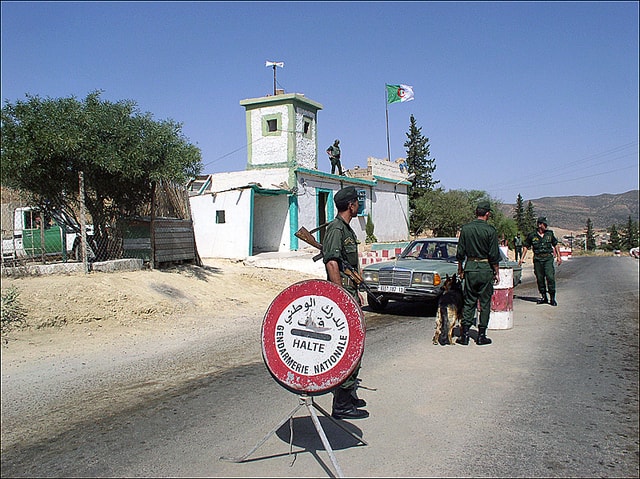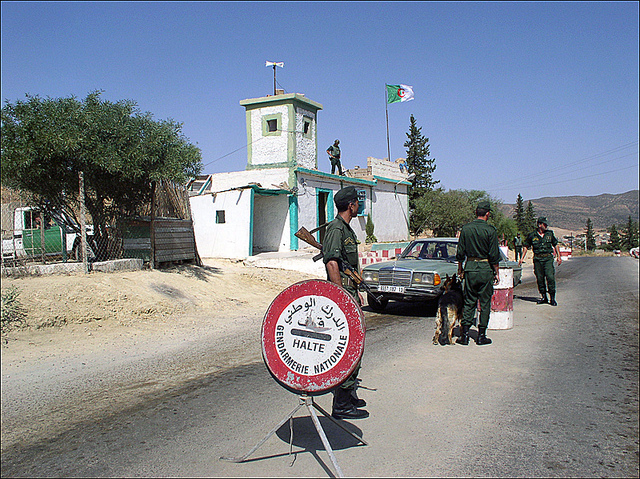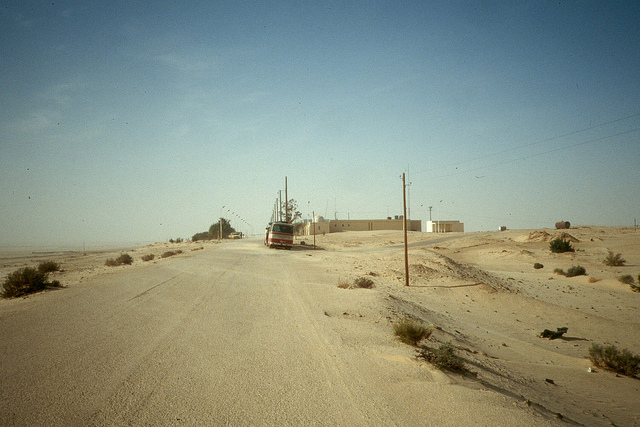North Africa’s national borders are troubled places. Algeria is planning to build a wall along its border for security from its chaotic neighbor, Libya. The Tunisian town of Ben Guerdane, on the border with Libya, is known as a haven for weapons smuggling. Meanwhile, the Moroccan-Algerian land border has been closed since 1994, due to tense relations between the countries.
William Lawrence, an expert on the Middle East and North Africa and a professorial lecturer at George Washington University’s Elliott School of International Affairs, researches the informal economies of North African countries, all of which are heavily influenced by the status of national borders. He presented on this research at the Middle East Studies Association’s annual meeting in Boston in November.
JMEPP’s Anna Boots spoke with Lawrence on smuggling and security along North Africa’s borders, and what can be done to address these challenges.
Journal of Middle Eastern Politics and Policy: Could you speak a little bit about the colonial history of these borders, and how the implementation of these borders affected the people living near them?
William Lawrence: Well, I think the simplest thing to say for the long haul of history is that going back hundreds of years, there was more often a thing called Morocco and a thing called Tunisia … but for longer periods there was not always a thing called Libya or a thing called Algeria, in terms of these borders.
The borders certainly weren’t unchanging – they changed quite a lot over time – but there was to a large degree a single entity which became Morocco and a single entity which became Tunisia, going back more than a millennium, in both cases.
As you get into the French colonial period, the French moved a lot of Moroccan and Tunisian territory into Algeria, which is why Algeria is somewhat shaped like a pyramid. And that was the source of major border conflicts and lack of agreement between independent Tunisia, independent Morocco, and independent Algeria … But in the end, the leaders of all three countries decided that it was better to stick to colonial borders than to fight new battles.
You can argue that a lot of wars have been fought anyway over colonial borders, but there would probably have been a lot more wars if they hadn’t decided on such restraint. Plus, there’s no such thing as a perfectly homogeneous ethno-national group in Africa contained within a single border, so when you’re moving a border, you might be moving from an area that’s 60%-40% this way to an area that’s 40%-60% the other … And at some point, you give up trying to move a border to a perfect location because there’s no perfect border between ethno-national groups … In the end, the borders are colonial, and they are what they are.
Now, it’s true of nearly every African border, including these ones, that ethnic populations are cut and families are cut, kinship networks are cut into pieces. And yet, when you travel across these borders … you immediately feel you’re in a different country. And in the case of North African borders, even the language shifts pretty quickly. Even if in the border towns, you’ll find people speaking [a] mish-mash dialect between … typical Moroccan Arabic and typical Algerian Arabic. As you move inward from the border in either direction, you’ll quickly see a consolidation of a national dialect and national culture rather quickly.
So the idea that these aren’t national populations is a phony idea, even though the borders cut things in funny or unnatural ways.
JMEPP: How do the borders affect the economies, both formal and informal, of these countries?
WL: There’s no question that the borders affect the economies significantly, that Morocco and Tunisia import a lot of smuggled goods from Algeria and Libya, and vice versa. Typically, you have a lot of petroleum products and other subsidized goods coming into the other two countries from Algeria and Libya, and then you’ll have food and pharmaceuticals and other subsidized goods going the other way.
The reason there are tariffs … is to protect subsidized goods that are subsidized for national populations that can’t otherwise afford them. The borders are there to protect, so that a government doesn’t have to subsidize not only its own country’s consumption but the neighboring country’s consumption. But it doesn’t work correctly, and that creates mass amounts of smuggling. In part for that reason, now, even semi-officially, the informal sector is around 40% in each of these countries, pushing 50%, and you’ll have the majority of people in these countries working in the informal sector. Big portions of them are moving goods across these borders.
This has a lot to do with what is happening economically in these countries, in Libya in particular. Most of the goods people consume were smuggled, somewhere, at some point.
JMEPP: That segues into my next question – how is the security situation in North Africa playing out at the borders, especially with regards to Libya?
WL: We could spend a whole hour just talking about that, the European assistance to Libya to firm up its borders – which has not gotten very far yet, although there’s to some degree a plan in place. Tunisia built a trench along its whole border, and a mound, like a berm. The ditch has been better at catching smugglers’ cars than terrorists’ cars, but it has been working to a limited degree.
The Algerian government has been deploying significant increases in forces along its Libyan border, mostly to block terrorists from coming in. There’s also a deployment along the Tunisian border related to the Chambi Mountains insurgency there.
There are groups of Moroccans who criss-cros Algerian territory, who show up on our radar when arrested. But they’re often not caught at the border, they’re caught in the interior of Algeria. Some of them are clearly going to Libya to fight; most of them are looking for work in Libya or Tunisia or wherever. So you have east-west flows along with north-south flows of economic migrants and refugees.
Recently, in Sirte [a Libyan city where the Islamic State has had a substantial presence], you’ve seen a number of migrants who get hired in support roles or even terrorist roles, who get engaged with a struggle purely for economic or survival reasons, including sub-Saharan migrants who are heading north to Europe through Libya. You have the informal economy overlapping with terrorist movements and goals, and the same thing with migrants.
JMEPP: What would you propose as a policy solution to some of these economic and security challenges?WL: There’s no one fix-all solution – these are very big and complicated problems that need holistic solutions. Most economists and security experts have been evolving in their thinking over the last four or five years, because the things they thought would work haven’t worked out. Clearly, closed borders kill local economies. Wide-open borders increase risks. There’s some balance between closed and open that has to be found.
Given all of the economic issues that are driving a lot of the smuggling, that needs to be dealt with. One of the ideas that is often floated – I’m not sure if it would work – is this idea of free exchange zones on the borders that would dampen some of the smuggling demand and supply, because you’d be able to buy goods at prices closer to the smuggling market value. And certainly, these populations starved for economic opportunities would benefit from bigger government inputs and market rationalization.
I started to tell the story during my presentation of a Spanish official in Mellila who simply suggested building a center for the women who spent whole days carrying 60-kilo loads back and forth across the border – the “mule women” – and he was absolutely massacred in the media and political circles because he was “encouraging smuggling.”
So the proactive, humanitarian impulse has backlash against it, in part simply because people … think a more draconian approach will be successful, which it won’t, but that’s the way people are conditioned to react until they get more information and see effective action.
I talked about the fact that Moroccans on the Algerian border don’t want the border to open, because they’re suspicious of all sorts of malicious activity and characters going across the border. And the same thing goes for Algerians. If you ask everyone in Oujda, “Why don’t you want the border open?” the first thing they’ll say is terrorism. If you ask everyone in Algeria, “Why don’t you want the border open?” the first thing they’ll say is hashish. And yet, there is demand in Morocco for the goods coming across from Algeria, and there’s a big demand in Algeria for hashish and other goods coming across the border, and to simply leave the border closed has been shown to lop two or three points off of GDP growth per capita every year. If all flows become illicit, it is harder to track them than if you permit more licit exchanges and focus you efforts on the illicit, decreasing the costs of legitimate trade and increasing the cost of criminal trade.
That closed Morocco-Algeria border is the reason North Africa is the lowest trading area in the world. They have not dealt with the fact that the closed border is terrible for both economies, and many people do not understand how they would benefit from an open border, or the idea that you could still police goods coming across an open border.
So it’s complicated, and the solution is that you need hyper-local solutions – it might be subsidies on a sliding scale in a particular area, or rethinking what needs subsidization, and targeting needy populations with vouchers or other payments rather than subsidizing everyone… The first thing is to really understand the problem backwards and forwards, and I’m very encouraged by the fact that all of the North African states, particularly Tunisia and Morocco, are aware of how important this area is and are investing a lot of money to study it. And hopefully, those studies will lead to locally appropriate solutions that sustain local populations.


